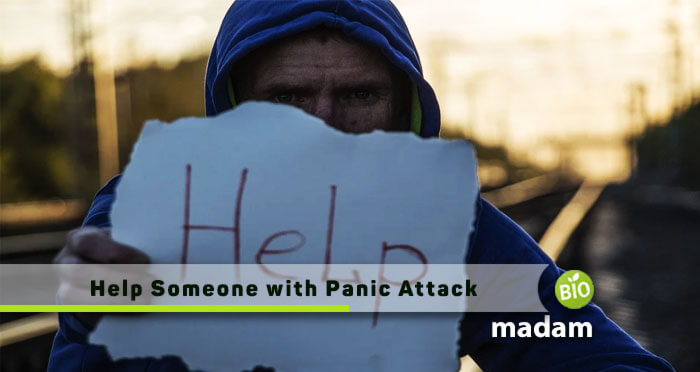Do you know someone who experiences sudden attacks of overwhelming fear for several minutes? They might be suffering from a panic attack.
What is a Panic Attack?
A panic attack is characterized as a sudden wave of discomfort or fear that causes a severe physical reaction to a person. A person with an episode may feel entirely out of control of a certain situation. Panic attacks occur unexpectedly even if the external threat is unrelated to the episode. This can cause a lot of distress to the person experiencing the episode, and triggers aren’t exactly easy to identify. So, people who have this are often incapacitated whenever they’re overstimulated in crowds.
Common Symptoms of a Panic Attack Include the Following:
- Heightened vigilance for danger
- Increased heart rate
- Shortness of breath
- Dizziness
- Trembling
- Muscle tension or twitching
- Intense fear
- Sweating more often
- Inability to focus or think clearly
- Nausea and digestive issues
- Dry mouth
- Shutting down as a way to avoid triggers
What Causes a Panic Attack?
The root cause of panic attacks is still unknown due to the lack of scientific-based evidence. But these are some of the factors many researchers believe might contribute to developing frequent episodes into a disorder.
- Genetics: A person is more likely to develop a panic disorder if there’s someone in their family who suffered from it too.
- Traumatic life events: Traumatic experiences like physical or verbal abuse, the death of someone important to you, or a divorce could lead to this because it worsens during times of stress.
- Abnormal brain changes: Certain changes in the parts of the brain can cause panic attacks. The brain might be physiologically altered due to the events a person experiences.
What Happens to the Body During a Panic Attack?
The episode arouses their body to high levels of excitement, making them feel no control of themselves. The mind is under a false ‘fight or flight mode, whether the threat or trigger is real or not.
Physiologically, cortisol and adrenaline are released into the bloodstream. These hormones are known to induce a panic attack. Once the mind fixates on the threat, whether real or not, it will be hard to distinguish between reality and the perceived threat.
Although the panic attack alone could not be deadly and there are no recorded cases of persons dying, complications like asthma and other pre-existing medical conditions can make it harmful.
Are Anxiety Attacks and Panic Attacks the Same?
You’re probably heard of these occurrences. Many people use these terms interchangeably because they both can cause interference to the life of the one who suffers from them. Also, both conditions respond to the triggers with intense fear and dread. But what’s the difference?
Anxiety is a common human emotion. A person might feel unpleasant at the moment, but it can motivate and protect the person from danger. The feeling of anxiety is usually built up by gradual anticipation of a situation or event. Anxiety complicates the problem if it hinders the person from functioning normally in their daily life. It can come in many forms, like social anxiety or a phobia. A person with anxiety disorder can be alert or feel worried constantly.
On the other hand, panic attacks are sudden or unexpected attacks of anxiety and fear. A person won’t know what hit them because it comes without warning. Their “fight-or-flight” mode becomes suddenly activated. If someone experiences a panic attack once, it’s most likely to happen again and develop into a panic disorder.
Some experts would say that both of these conditions may not be entirely curable but are manageable. Luckily, some facilities offer inpatient and outpatient therapy. For instance, if you visit the website https://apibhs.com/anxiety-treatment, they can assist patients 24/7. These medical facilities specialize in handling panic and anxiety-related disorders and provide individualized therapy, so you’re assured that your friends or loved ones are under the best care.
What to do When Someone is Experiencing a Panic Attack?

Now that you have a deeper understanding of a panic attack, what should you do when someone happens to have an episode? What are other measures you can take to manage such situations?
Here are tips and techniques you might want to use to handle panic attacks.
Stay Calm
If you’re with someone having an episode, remaining calm is one of the best ways you can help. Usually, panic attacks tend to last for about 5 to 10 minutes. But it can feel endless for someone who’s having a panic attack because they may temporarily lose their concept of time. Feelings of dread are also intensified.
When witnessing someone having a panic attack, try your best not to let yourself be overwhelmed by the situation. Stay calm so you won’t add to the person’s anxiety. Even if you may also feel alarmed, try to talk to them in a low pitch and calm voice, say reassuring words like you won’t leave them unless they said so, or remind them that they’re safe.
Ask Them How You Can Help
Most people who suffer from panic attacks have a coping mechanism to deal with it. When you offer your help, you must keep in mind that they know what’s best for them so ask them right away.
But, during an episode, you might find it hard to communicate. You can ask them in advance how you could assist them in case a panic attack happens. If you didn’t have the chance to ask them in advance, prepare for the possibility that they might lash out at you. They’re on high alert to threats, so their ability to think logically is affected. Don’t try to take their response personally. As much as possible, you have to remain neutral.

As long as their life is not in immediate danger, you should give them space if they ask you to. But it would be best if you stay in the vicinity so you could keep an eye on things.
If they’re receptive to having a conversation during an attack, you could start by asking the question, ‘Are you reacting to the current situation or something that happened in the past?’. This would refocus their attention, and it will help them recognize if their trigger is a product of a flashback. This would also sort out their thoughts. Listen to their answer and accept what is given, because sometimes a person suffering from an episode has been in traumatic situations, so their reactions are strong.
Put Them at Ease
This tip is easier said than done. You have to be careful in treading the person’s boundaries, especially when they experience an episode. Don’t ever touch the person having an anxiety attack without getting their permission. Most often, touching them will increase their panic and make the situation worse than it is.
You can remove them from the trigger of their panic attack. Preferably, take the person to a quiet area they’re familiar with or tell them where the location is. Relocating them without their knowing will worsen their episode because they won’t feel safe with their surroundings.
Encourage them to Control their Breathing
One of the symptoms of a panic attack is shortness of breath. Controlling their breathing is one of the helpful ways to manage this symptom. Here are some techniques you might advise them to do to normalize their breathing:
- Breathe using a paper bag: If the person is receptive to your offer to help, get a paper bag where they can breathe into. But you must also note that the paper bag itself is the trigger to their panic attack, so you must be careful. The paper bag will help prevent hyperventilation if they take short, rapid breaths. However, this does not apply to those who hold their breath.
- Try counting breaths: This method works by asking the person to breathe in and out on your count. Do this by counting aloud, encouraging the person to breathe in for short periods first but gradually increasing the count until their breathing has slowed down.
Get them to inhale through their nose and exhale through their mouth. Try to do this with them for more effective results.
Acknowledge Their Triggers
When a person is experiencing an episode, it’s essential to acknowledge their fears seriously.
Do not invalidate their emotions. Avoid saying ‘It’s all in your mind.’, ‘You’re overreacting.’, or ‘You need to calm down.’ because it will only worsen their episode. Telling them that there’s nothing to panic about will only put them into higher vigilance. This will only emphasize that they’re out of touch with reality which, in turn, will make them panic even more.
Seek Medical Attention
If the individual only experienced the episode for the first time, seek emergency medical attention immediately. This will be especially helpful for people with chronic illnesses like asthma or diabetes. In a worst-case scenario, a panic attack can cause complications to these people. Keep this tip in mind when you’re assessing the situation.
Also, if the symptoms don’t subside within a few hours, call for urgent medical attention immediately. Even if it’s not a life-or-death situation, an ER doctor might be able to provide them with relief. If an ambulance came, they might administer Valium or Xanax to the person to reduce the adrenaline in their body. This is one of the most effective treatments for panic attacks because it will lower their heart rate almost immediately.
Don’t Pressure Them
If the person asks for space, don’t pressure them to do things that worsen their anxiety. Don’t demand answers from them by having a conversation or figuring out the cause of their attack.
Instead, listen supportively. Observe the changes in their behavior. Let them decide how to act at their own pace.
Address Their Immediate Needs
If someone obtains an injury from a panic attack, it would be best to tend to it. Injuries might include wounds from erratic behavior or falling into something from being dizzy. They’re probably unaware that they got an injury from their episode, so it would be best to check on them as soon as the attack is over to avoid further complications.
Encourage Them to Get Therapy
As mentioned earlier, panic attacks cannot be entirely cured are manageable. It would be best to seek therapy to address the root cause of their panic attack. Panic attacks don’t just come from nowhere. They are a form of anxiety that comes from the past traumatic experiences of the person.
A good therapist should be able to narrow down the person’s triggers. Or, at the very least, they might be able to explain what is happening to the body when a panic attack occurs. Seeking therapy won’t be that difficult because many counselors now offer their services online for confidentiality and convenience.
Look After Yourself
Extending your help to someone who experiences panic attacks can be difficult and draining. It can exhaust you because you need to be sensitive to their needs whenever the episode occurs. You have to remember that you’re human, too, and are prone to tiredness. Being alarmed by the situation is a healthy response when you witness it. So, you have to make sure that you care for yourself too. Here are some tips you can use not to overextend yourself:
- You must set firm boundaries about what you can and can’t do to help them. For instance, you can tell them they can hang out with you if they need someone to talk to. It will be ideal if they inform you beforehand if they need your company, so you can also prepare yourself emotionally and mentally.
- If helping your friend suffering from a panic attack is starting to take a toll on you, you can turn to activities you once loved, or you can always talk to other friends you trust.
- Talking to a mental health professional can be helpful, too, if you’re feeling overwhelmed. This will help you and the person who experiences panic attacks. A therapist will provide you with useful information on how to handle yourself when you’re witnessing an episode. In turn, you will be able to help them more. Take care of yourself so that you can provide care for others.
Final Thoughts
Panic attacks are often characterized as a brief episode of intense anxiety. Witnessing someone close to you having an episode can be overwhelming and confusing because most of the time, you won’t know if what you’re doing is right. It may feel like you are treading dangerous waters.
However, this should not always be the case. Knowing the tips mentioned above will help you deal with the situation more effectively.

Hi, they call me Jenna, and I am also known for achieving a gold medal during my Ph.D. in science life. I always had a dream to educate people through my utmost writing hobby. So, I chose this blogging path, and Biomadam gave me this opportunity to present for them. I now stand to entertain you. Continue reading my articles & discuss if you’ve any confusion through the comment section below.

